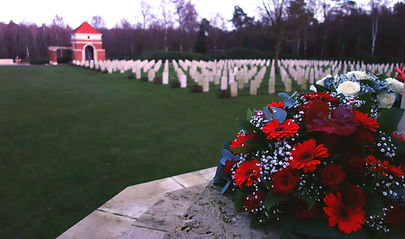Rituals for the Dead and Mourning
The ritual customs around dying, the deceased and the bereaved have diminished enormously after the upheavals of the past centuries. Again, the rituals, guidance and certainly the religious character around dying have greatly diminished and forgotten. The Enlightenment brought us reason and wanted to reduce fears in general, partly through the "victory" over darkness, the body and nature through science and reason.
Slowly, rituals from pre-Christian times disappeared and people began to fear death and the life after, and folk beliefs became increasingly disconnected from everyday life. Today's customs around dying are stripped of religious influences, are short, quick and preferably we just want the incident to be concluded quickly. We now prefer to deal practically with negative feelings, get on with life, which is what everything is about.
Spiritual guidance around dying is hard to find, except in the philosophical corner and the church. But now many people are religious outside these structures, they are spiritual, often they do believe in some kind of God and sometimes they adhere to a nature religion. People believe in an afterlife, have questions about it but cannot turn to anyone.

The dark goddess and sickle of Frau Holle, European goddess of death and rebirth.

Flowers at a roadside altar on Texel
In ancient times there were and priests but also, even further back, shamans and other medicine women and men to whom people went to consult when they themselves were about to die or someone had died, and laid to them their grief but also their questions. Where is my loved one now? Where am I going? What do I need to do to die well? What does my dying person need next to? What are rituals I can do after death?
I offer my guidance in this, as a shaman in the Spirit of Wolf tradition, dying rituals are inseparable from the work itself. Dying is part of life, every minute something dies, in yourself or around you. An idea, a hair, a plant, an insect. Like marriage and birth, we also work with Death. We see her as a merciful door to the other side, she comes for everyone but the path to it is important to walk in relative peace and acceptance to find peace as a soul, after laying down the physical body.
All the rituals I use come from the tradition of Spirit of Wolf.
My relationship with death
Death is inextricably intertwined with my life. When I was 27, I saw my father die before my eyes, then I had the opportunity to keep 2 other family members company on their deathbeds. I know the overwhelming feelings of grief and sorrow, as well as the loss. I also know the difficult feelings while watching over the dying, mourning in life and my time in care has taught me about what exactly happens to the dying.
It is an intense, emotional time when death comes into your life. But that time is not all negative to look at, sometimes great feelings of acceptance or unity, or resignation occur and people reconcile. Death brings us back to the essence, what is important in life? What does life mean to me? Who are important? It strips us of all side issues and brings us to the core; Who am I? Death teaches us about life.

A specific altar dedicated to praying for the dying person. Feelings are structured, channeled and aimed at promoting the dying and also mourning process.
What can I do for you and/or your loved one(s)?
- Spiritual and psychological (emotional) support for the dying and bereaved through counselling
- Rituals during funeral/cremation services
- Support in grieving through different methods such as certain rituals
- Support for your loved one who has died, guiding the soul to the other side (through 3-monthly fire rituals)
- Remote rituals to support the dying and loved ones in terms of energy, emotion regulation, tension release and maintaining connection with each other
These services are subject to a customised fee; this is determined in consultation with those involved and recorded in writing
For more information on my working methods and other questions related to mourning and dying, please send me an e-mail.

